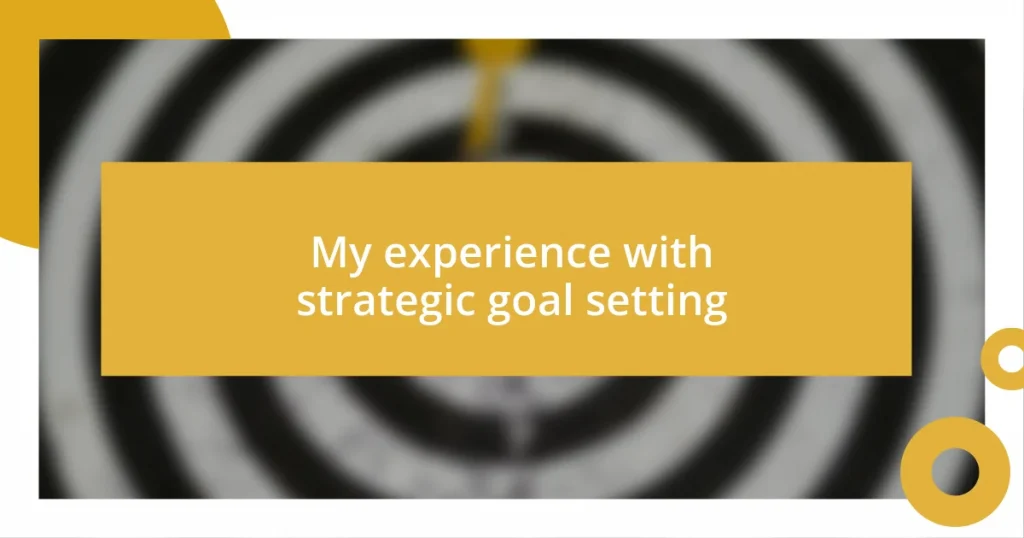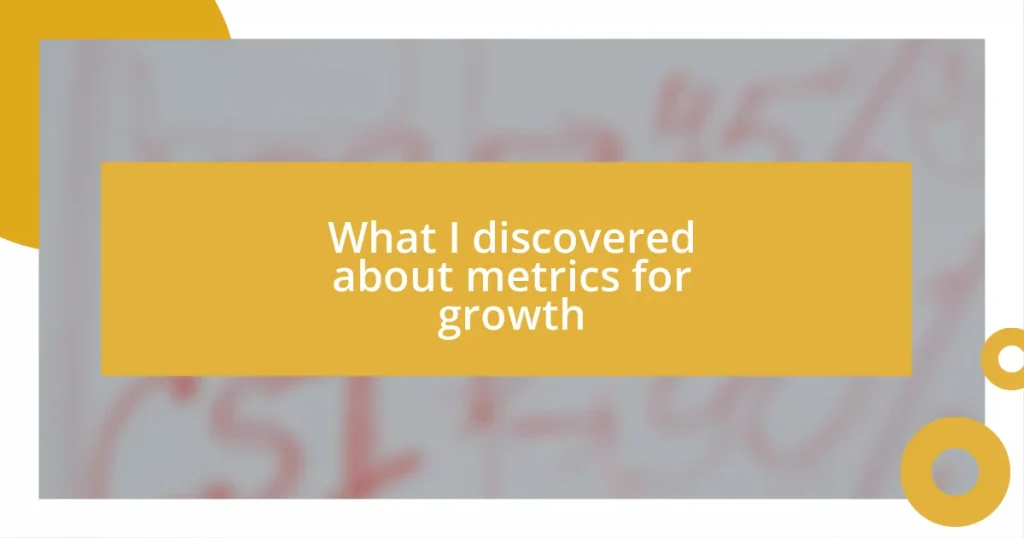Key takeaways:
- Strategic goal setting is a continuous process that involves refining goals and integrating feedback to adapt to changing circumstances.
- Setting SMART goals (Specific, Measurable, Achievable, Relevant, Time-bound) enhances clarity and motivation, allowing for better tracking of progress.
- Overcoming challenges in goal setting requires managing expectations, embracing flexibility, and leveraging accountability through support systems.

Understanding strategic goal setting
Strategic goal setting is like having a map that guides you on your journey. I remember a time when I felt lost in my career, unsure of which direction to take. It was only after I took a step back and crafted clear, purposeful goals that I began to see a path unfold before me. Have you ever felt that sense of clarity that comes when your goals align with your values?
To truly grasp strategic goal setting, it’s crucial to think of it as a process rather than a one-time activity. For instance, when I started my own project, I began with broad objectives and gradually refined them into actionable steps. This evolution not only kept me motivated but also helped me adapt as circumstances changed—much like how a sailor adjusts their sails depending on the wind.
Moreover, integrating feedback into your goal-setting strategy can enrich your journey. There was a time when I sought input from my peers, and the perspectives they offered transformed not just the goals themselves but my entire approach. This experience taught me that collaboration often leads to deeper insights and more robust outcomes. Have you considered how feedback might enhance your own strategic planning?

Importance of goal setting
Setting goals is fundamental because it provides direction and purpose. From my perspective, clear goals function as a compass that not only points us toward our desired outcomes but also helps measure our progress. I recall when I had a big project due; having specific milestones in place kept me focused and motivated, rather than feeling overwhelmed by the enormity of the task. It was like stepping stones leading me across a challenging river.
Goal setting also significantly boosts motivation and productivity. When I embraced this practice, I noticed a shift in my enthusiasm towards my daily tasks. Each completed goal, no matter how small, felt like a win. It fueled my drive to tackle even bigger challenges. Have you experienced that rush of satisfaction when you check something off your to-do list? That sense of accomplishment powers us to move forward with even greater determination.
Moreover, goals help in overcoming procrastination—something I used to struggle with. I remember aiming for a significant deadline; breaking it down into smaller, manageable goals transformed the daunting task into achievable steps. I learned that each small action creates momentum, pushing us closer to our ultimate objectives. How do you tackle procrastination? Setting clear goals can be the catalyst for change.
| Importance of Goal Setting | Impact on Personal Experience |
|---|---|
| Provides direction | Acts as a compass during uncertainty, guiding me through challenges. |
| Boosts motivation | Each milestone reached fuels my enthusiasm for larger tasks. |
| Overcomes procrastination | Breaking tasks into smaller goals creates momentum and reduces overwhelm. |

Identifying personal strengths
Identifying personal strengths is an essential step in the goal-setting process. From my own experience, I’ve noticed that taking time to reflect on what I’m good at helps me align my goals with those strengths. When I was evaluating my skills, I kept a journal where I noted down moments when I felt competent or proud of my work. This exercise illuminated parts of my character that I hadn’t fully appreciated before. Have you ever stumbled upon a hidden talent while reflecting on your past achievements?
Here are some strengths I discovered about myself during this journey:
– Adaptability: I can adjust my approach when facing new challenges.
– Empathy: Understanding others’ perspectives has always been a strong suit for me, enriching my collaborations.
– Creativity: I often find unique solutions to problems, which helps me stand out.
– Resilience: I’ve learned to bounce back from setbacks, which fuels my determination.
– Communication: Sharing ideas clearly has enabled me to inspire and influence those around me.
Recognizing these strengths empowered me to set more attainable goals that resonate with my values. When I think of the goals I’ve achieved, they often stemmed from leaning into these attributes. This strengthened my confidence and increased my commitment to personal and professional growth. Are you ready to explore your own strengths and how they can shape your future?

Setting SMART goals
Setting SMART goals can transform the way we approach tasks and aspirations. I remember when I first learned about this framework—Specific, Measurable, Achievable, Relevant, and Time-bound. It was a game-changer for me. Instead of vague ambitions like “I want to get fit,” I started crafting specific goals like “I will jog for 30 minutes, three times a week.” This clarity made it easier to track my progress and stay motivated.
Being measurable is equally important. I set benchmarks for my goals that allowed me to assess my growth frequently. For instance, when aiming to increase my reading habits, I committed to finishing at least one book each month. It wasn’t just about finishing the book but tracking how many pages I read daily. Each completion was a mini-celebration, reminding me of how tangible progress can be.
Perhaps the most challenging aspect for me was ensuring that my goals were achievable and relevant to my life. I recall the excitement of setting a lofty target, only to realize it might not align with my current responsibilities. When I adjusted my ambitions, focusing on what truly mattered to me, my motivation soared. How about you? Have you ever had a goal that felt right but turned out to be just a little out of reach? Finding that balance is essential, and it often leads to a more fulfilling journey.

Developing an action plan
Developing an action plan requires translating your goals into concrete steps that keep you focused and motivated. When I was mapping out my own action plan, I broke it down into weekly tasks. This method not only simplified my journey but also made daunting objectives feel achievable. For example, if I aimed to enhance my public speaking skills, I would schedule practice sessions each week. It was all about creating a rhythm.
One aspect I found particularly useful was incorporating deadlines for each task. I remember setting a date to deliver a presentation at a local community event. That urgency forced me to take consistent action. It also helped me to visualize the endpoint, making the journey less overwhelming. Have you ever felt the weight of an upcoming deadline propel you to work harder? I often find that pressure to be a surprisingly motivating force.
Lastly, I always include reflection in my action plan. After accomplishing tasks, I take a moment to assess what worked and what didn’t. This process of evaluation has taught me to adapt and refine my plans continually. I can recall moments when I adjusted my approach after realizing that some strategies didn’t fit my style. How about you? Do you allow yourself the flexibility to pivot when necessary? Embracing that dynamic nature of planning has truly transformed my results.

Tracking progress effectively
Tracking my progress effectively has been a game-changer in my journey toward achieving my goals. I remember my first experience with a progress tracker; it was simply a spreadsheet where I logged my daily activities related to my goals. Watching the numbers climb week by week was oddly satisfying. Have you ever felt that rush when you tick off another item on your list? That sense of accomplishment fueled my motivation to keep moving forward.
As I delved deeper into tracking, I realized that reviewing my progress periodically was essential. I set aside time every month to assess what I had achieved and where I fell short. It was during these reflections that I discovered patterns in my behavior—like the times I was more productive or when distractions derailed my progress. Understanding these insights empowered me to adjust my strategies. Have you taken the time to reflect on your habits? It’s amazing how a little self-awareness can lead to big changes.
I also experimented with various tools and methods for tracking. One of my favorites was using a habit tracker app on my phone. The visual representation of my progress brought my goals to life. I vividly recall the excitement as I watched my streaks grow longer. Each green tick was more than just confirmation; it represented dedication and commitment. How do you keep yourself accountable? Finding a system that resonates with you can make all the difference in staying engaged and motivated throughout the journey.

Overcoming challenges in goal setting
Navigating the roadblocks in goal setting is something I’ve faced time and again. One significant challenge was managing my expectations. There was a time when I aimed for an ambitious fitness goal, wanting to lose a certain amount of weight in just a month. I quickly learned that in setting overly lofty goals, I was only setting myself up for disappointment. Have you ever felt that sting of unmet expectations? It taught me to embrace smaller, more manageable milestones instead, allowing me to celebrate small victories along the way.
Sometimes, external factors can throw a wrench in our plans. I once had a tightly mapped-out timeline for a product launch, but unforeseen circumstances pushed everything back. Instead of feeling disheartened, I chose to reframe that setback as an opportunity for improvement. This shift in mindset not only eased my anxiety but also paved the way for innovative ideas I hadn’t considered before. How often do we let life’s unpredictability dictate our progress? Adopting flexibility in the face of challenges has truly strengthened my resilience.
Finally, I realized that accountability plays a crucial role in overcoming hurdles. I vividly remember partnering with a friend to keep each other motivated in our respective goals. We shared our struggles during weekly check-ins, providing support that transformed our journeys. Have you found a support system that works for you? Knowing that someone else was cheering me on made all the difference, reminding me that we don’t have to navigate our goals alone. This experience highlights how collaborative efforts can illuminate our path, making the challenges of goal setting feel a little lighter.














